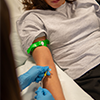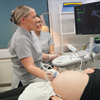Eating well during pregnancy is one of the most important ways to support your health and your baby’s development. With so much information about what’s safe and what’s not, navigating pregnancy nutrition can feel overwhelming. Here’s a guide on what you can enjoy, what to avoid, and tips on making the most of each meal to keep you and your baby healthy.
The Basics: Nutrient-Rich Foods to Include
A balanced diet is key during pregnancy. Try to include a mix of these nutrient-dense foods in your daily meals:
- Fruits and Vegetables
Aim for at least five servings of a colourful variety daily. These provide essential vitamins, minerals, and fibre, which can help manage digestion and prevent constipation. - Whole Grains
Whole grains like oats, brown rice, and whole-wheat bread offer complex carbohydrates and are rich in fiber and B vitamins, supporting energy and healthy digestion. - Protein
Lean meats, poultry, fish, eggs, beans, and nuts are excellent sources of protein, which is crucial for your baby’s growth, particularly in the second and third trimesters. - Dairy or Dairy Alternatives
Calcium is essential for your baby’s bone development, so aim for three servings of milk, yogurt, cheese, or calcium-fortified alternatives daily. - Healthy Fats
Include healthy fats like those found in avocados, olive oil, and nuts. Omega-3 fatty acids, which are found in fish like salmon, are particularly beneficial for your baby’s brain and eye development.
For more on pregnancy nutrition, see the NHS guide on foods to eat during pregnancy.
Foods to Limit and Avoid
While many foods are safe in moderation, certain foods should be limited or avoided to protect both you and your baby.
- High-Mercury Fish
Fish like swordfish, king mackerel, and shark are high in mercury, which can affect a baby’s developing nervous system. Stick to low-mercury fish options, like salmon, cod, or tilapia. - Caffeine
High levels of caffeine have been associated with pregnancy complications, so it’s best to limit intake. The NHS recommends keeping caffeine intake under 200mg per day, which is roughly one cup of coffee or two cups of tea. - Alcohol
Experts recommend avoiding alcohol entirely during pregnancy, as it can negatively affect your baby’s development. - Raw or Undercooked Seafood, Meat, and Eggs
Avoid sushi, undercooked eggs, and rare meats to reduce the risk of foodborne illnesses, which can be more severe during pregnancy. - Certain Soft Cheeses and Deli Meats
Avoid unpasteurised soft cheeses, like brie or blue cheese, and deli meats due to the risk of listeria, a bacteria that can harm a developing baby.
For more on what to avoid, check the NHS list of foods to avoid during pregnancy.
Hydration Matters
Staying well-hydrated is important for both you and your baby, aiding digestion, nutrient absorption, and circulation. Aim for about 8-10 cups of water a day. Including foods with high water content, like fruits and vegetables, can also help keep you hydrated.
Safe Snacking Tips
Pregnancy often comes with increased hunger or cravings, and choosing nutritious snacks can make a big difference. Here are some healthy, satisfying ideas:
- Yogurt with Berries – High in calcium and antioxidants.
- Peanut Butter Butter on Whole-Grain Toast – Packed with healthy fats and fiber.
- Carrot or Celery Sticks with Hummus – A good source of vitamins and protein.
- Fruit Smoothies – Blend your favorite fruits with a handful of greens for a tasty, nutrient-rich drink.
Essential Supplements
Even with a balanced diet, some nutrients can be challenging to get enough of, so your doctor may recommend supplements:
- Folic Acid – This is crucial before conception and during early pregnancy to reduce the risk of neural tube defects.
- Vitamin D – Important for your baby’s bone health, and especially necessary in climates with limited sunlight.
- Iron – Helps prevent anemia, which is common in pregnancy.
Check with your healthcare provider before adding any supplements, as they can help guide you on what’s needed.
Listening to Your Body
Pregnancy cravings and aversions are common. Many women find they have a strong preference for certain foods while being turned off by others they previously enjoyed. It’s okay to indulge in cravings in moderation, as long as you aim for balanced meals overall. If cravings become intense for non-food items (a condition called pica), consult your healthcare provider.
Eating well during pregnancy doesn’t have to be complicated. Focus on a variety of whole foods, stay hydrated, and make balanced choices, and you’ll be well on your way to supporting your health and your baby’s development. Remember, Window to the Womb is here to support you through each step, from scans to resources, to make your pregnancy as smooth as possible.
If you’re ever unsure about what’s safe or need personalised guidance, don’t hesitate to reach out to your healthcare provider for support.
Eating a nutritious, balanced diet will make you feel your best—and help your baby grow strong and healthy, too!













 Packages & Prices
Packages & Prices  Important Info & Policies
Important Info & Policies  Your Scan
Your Scan